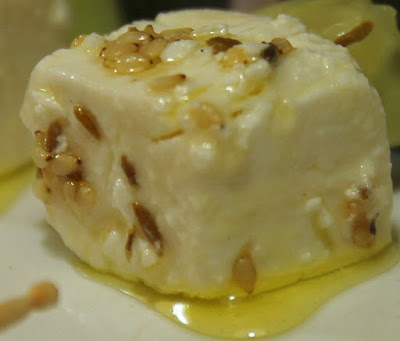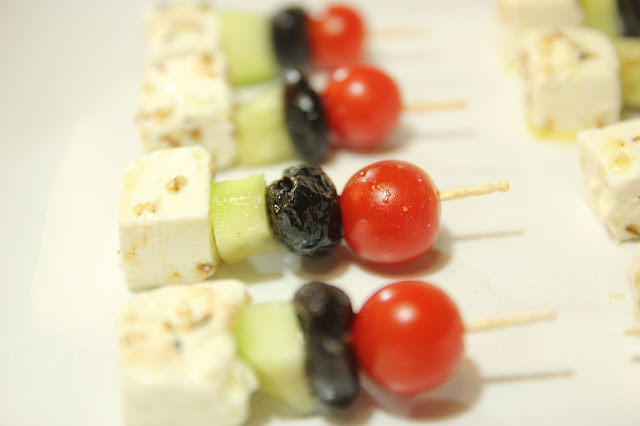In the 1926 edition of Mrs Beeton's Book of Household Management, the inclusion of cocktails was prefaced with the words '....chiefly remarkable for the many ingredients which enter into their composition, the use of various fresh fruits in addition to lemons and oranges and the extraordinary names bestowed on many of (them)'. Cocktails and cocktail foods have a rather mythical colourful history, an international flavour and are also associated with times of upheaval, unrest and often despair perhaps they are the leitmotif for an era when people just want to eat
drink and be merry.... That said cocktail parties, with or without alcohol are a great way to start on the 'entertaining-at-home' circuit. There are so many foods that can be cunningly presented on sticks, as I hope I'm going to be able to prove. Furthermore, with no cutlery/silverware and offering pretty cocktail napkins rather than individual plates, there is much less washing and clearing up!
The idea of serving food on sticks is as old as the hills but nowadays with the iconic cocktail stick and thus cocktail parties, it is perhaps the 1920s that spring to mind. On this side of the Atlantic, we might think of Evelyn Waugh and 'The Bright Young Things'. In legend, Waugh's elder brother Alec, is credited with throwing the first ever cocktail party. In the US cocktails are redolent of Scott and Zelda Fitzgerald, Jazz and Prohibition. Peter Waugh's theory is that the cocktail party was indeed an American phenomenon that his father introduced into England as an antidote to afternoon tea.
 |
| Syllabub was originally a drink |
The French also have a hand in cocktail legends with 'coquetier' meaning egg cup, when used by a Dr Peychaud, as an impromptu spirit measure. An apothecary/physician born in Bordeaux, Dr Peychaud re-established his business in Louisiana, in the French Quarter of New Orleans, having fled Saint-Domingue during the Slave Rebellion in 1791. As a popular orator and Freemason, after lodge meetings a group of close friends and compatriots would adjourn to the back of his shop in the rue Royale, to partake of a few 'coquetiers'. When the circle of drinkers expanded to include English speakers the name was changed to cocktail. Peychaud's Bitters is one of the components of New Orleans' famous Sazerac Cocktails. In the US in the early 1800s, cocktails were originally referred to as 'slings' this came apparently from the German schlingen meaning to swallow something quickly! The idea of mixed fruit and alcoholic drinks and accompanying snack foods really goes back to 17th century punch drinking and the Punch Houses, popular haunts and alternatives to the possibly more sedate Coffee Houses and Cigar Divans. Above left, another precursor of the cocktail, an 18th century whipped cider syllabub with the Jamaica Tavern Coffee House c. 1868 pictured in the background.
The Feta I'm using is a classic Greek one and it's made from 30% goats' and 70% ewes' milk. I can attest to the common belief that Feta is sharper when it is made with a majority of ewes' milk. In fact this one was actually much tastier than any I have eaten before but it becomes even richer and more flavoursome with the marinade. The great advantage of using Feta for food on sticks is that it is easy to cut without crumbling and it sticks really well on, well...sticks.
1 tablespoon of sesame seeds
1 tablespoon of cumin or fennel seeds
The juice of one lime
The juice of one small lemon
Two tablespoons of olive oil
Szechuan or black pepper (freshly ground)
Mix all the ingredients together to form the marinade.
180g of Feta
24 of each of the following:
Cherry Tomatoes
 Cubes of Cucumber
Cubes of Cucumber
Black Olives
Cocktail Sticks
Thread a cube of marinated Feta onto each stick and then add the other ingredients. You can also use longer sticks and stand them vertically as the Feta makes a solid base for the rest!
Serve chilled or at room temperature.
Enjoy!
All that needs to be said now is Bon Appėtit!
Hope to see you here again for another recipe from my 100 Gluten-Free Organic Party Foods Challenge!
All the best,
Sue
A Foreword on Feta
The Feta I'm using is a classic Greek one and it's made from 30% goats' and 70% ewes' milk. I can attest to the common belief that Feta is sharper when it is made with a majority of ewes' milk. In fact this one was actually much tastier than any I have eaten before but it becomes even richer and more flavoursome with the marinade. The great advantage of using Feta for food on sticks is that it is easy to cut without crumbling and it sticks really well on, well...sticks.
Ingredients
For the Marinade:
(I used cumin because we really like the taste and it is a common spice used here with cheese but if you want something less spicy then fennel makes a great alternative accompaniment)1 tablespoon of sesame seeds
1 tablespoon of cumin or fennel seeds
The juice of one lime
The juice of one small lemon
Two tablespoons of olive oil
Szechuan or black pepper (freshly ground)
Method
For the Marinade:
Dry fry the cumin (or fennel) seeds and sesame until they begin to crackle and or you can smell them cooking (around 3 minutes). Allow to cool.Mix all the ingredients together to form the marinade.
Ingredients
For the Sticks:
(makes 24 appetisers)
180g of Feta
24 of each of the following:
Cherry Tomatoes
 Cubes of Cucumber
Cubes of CucumberBlack Olives
Cocktail Sticks
Method
For the Sticks:
Cut the Feta into cubes in a shallow dish and pour over the marinade. Make sure each cube is well coated and then cover. I marinated the Feta for around 60 minutes and it tasted delicious. The cheese still retained its distinctive sharpness and salty tang but obviously you can experiment with a longer marinating period if you wish.Thread a cube of marinated Feta onto each stick and then add the other ingredients. You can also use longer sticks and stand them vertically as the Feta makes a solid base for the rest!
Serve chilled or at room temperature.
Enjoy!
All that needs to be said now is Bon Appėtit!
Hope to see you here again for another recipe from my 100 Gluten-Free Organic Party Foods Challenge!
All the best,
Sue
MORE THINGS ON STICKS!
Devils on Horseback
The seventh recipe in my 100 Gluten-free Party Food Challenge. Nowadays served as an appetiser, this is a variation on the Victorian savoury Angels on Horseback itself a popular final dish served in a formal 19th century dinner....read moreSausage & Mash on a Stick
The thirteenth recipe in my 100 Gluten-free Party Food Challenge. A British traditional recipe on a stick. One of the Tavern dishes which was not pastry-based and is still a favourite pub meal today...read more60's Cocktail Party Classic: Cheese, Ham & Pineapple Sticks
The
twentieth recipe in my 100 Gluten-free Party Food Challenge. A 60's
cocktail party classic, cheese and pineapple on a stick but this time
with marinated cheese...read more
Radish Sail Boats Laden with Ricotta. Gluten-free
The fifteenth recipe in my 100 Gluten-free Party Food Challenge. Contrary perhaps to perceived wisdom, that picnics are a warm weather event, there is nothing quite...read moreFresh Figs, Smoked Salmon Wraps. Gluten-free
The
twenty-second recipe in my 100 Gluten-free Party Food Challenge. For a
Winter party there is nothing more refreshing than a reminder of
Summer; sun-kissed figs...read more
RETURN TO MAIN CONTENTS PAGE
RETURN TO 100 GLUTEN-FREE PARTY RECIPES CONTENTS
© Sue Cross 2017












Were did you buy the Feta Cheese? I mostly see fake Feta for sale.
ReplyDeleteHi there and thanks for your comments here and on Google+, they are appreciated! Here in France cheese is a very serious art and if you want to produce a named cheese you have to abide by the rules. There is even a special AOC label Camembert now that can only be made from milk of the ancient breed Normandie cow. That said foreign cheeses here do not seem to have the same rules, as I can buy a cheaper version of organic Mozzarella at my local supermarket which is made from cows' milk but that is clearly stated on the label. For Feta, I can get the real Greek traditional version in organic from both my local supermarket and my local organic store. To the French cheese is sacrosanct and I think with the new fashion of giving Din'Apéros, authentic cheeses that can be used an appetiser have a solid customer base. Amazon do sell goat and sheep milk Fetas but I have not linked to them because I only link to organic products and on my gluten-free recipes I only show links that are also certified gluten-free. Hope this is useful and all the the very best from sunny Normandie, Sue
Delete